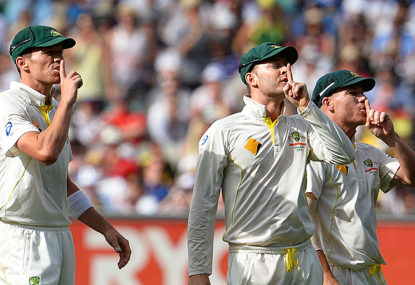I switched on my TV when the first over the Melbourne Ashes Test was underway. The impressive Ryan Harris was opening the bowling for Australia to Alastair Cook, who looked intent on scoring some runs faster than at a snail’s pace.
So I wrote a note down in my book that Michael Clarke had finally lost a toss this series, and then added some details about how useful winning the toss and batting first has been in this Ashes series and the last in the UK.
England’s three wins in England had come off the back of three winning tosses and batting first.
Australia’s three wins in this current Ashes series followed Clarke winning the toss and batting first.
Then the commentators started discussing the wisdom of Clarke putting England into bat. Quelle surprise!
What intrigued me in this commentary, which included at various times Mark Taylor, Shane Warne and Ian Chappell, was how supportive the commentary box was of Clarke’s decision.
The point was made that conditions were overcast and, therefore, conducive to good swing bowling. This after Nathan Lyon came on before the first hour of play!
The justification for this move was that the MCG pitch often helped the seamers and the sinners on the first morning of a Test.
‘If it swings,’ pontificated Warne, ‘it’ll spin.’
And Lyon did turn a couple of balls quite sharply, with some bounce as well as spin.
It was also pointed out that Australia was bowled out for 98 in the first innings of the last Ashes Test at the MCG. The conditions, too, were said to be overcast. But not long after this the sun came out making this point a bit moot.
In my view, despite the fact that Australia seem to be in the box seat with six England wickets captured for 226, Clarke has actually given a bruised, battered and divided England team its only chance to win this Test.
The famous quotation by Dr W.G. Grace about the merits of winning the toss and giving first use of the pitch to the opposition batsmen comes to mind here: ‘You should sometimes think about putting the other side into bat but never do it.’
It’s rather like the equally vexed issue in rugby of giving the wind away when you win the toss. There are all the arguments about closing down the game in the first half and then coming home to win with a wet sheet.
But these arguments are more theoretical than actual. In the majority of cases, the team playing with the wind wins, even when it is on paper an inferior side.
Putting the opposition in to bat usually goes the same sort of way.
The argument that you knock the opposition off quickly and then score so many runs you don’t have to use the pitch last sounds great, in theory. In practice, most teams have to bat a second time and the history of the game shows that chasing anything over 250 runs in a fourth innings is a task fraught with difficulties.
So Clarke, despite the fact that Australia has in fact seemingly bowled itself into a strong position, has given England a reasonable chance of winning this Test.
He should have batted and exposed the brittle England bowling attack to early work. Instead, the England bowlers will have a day and more of extra rest, which in the case of Stuart Broad will be extremely valuable given his bruised foot from the Perth Test.
Clarke has been lucky in that England batted so slowly and without conviction that they have slow-batted Australia well into the Test. Cook started off with some intent, scoring 17 runs off the first 17 balls he faced.
But then he went into a 23 minute trance. He emerged from the trance to proceed at glacial speed at run accumulation until he was dismissed.
His final tally of 27 took him 47 balls.
This batting rigor mortis affected all the batsmen, including Kevin Pietersen who played a steady hand that never put the Australian attack under any pressure.
It is clear that the intention was to take the attack to the Australian bowling. But after the first initial short flush of run, the intention was smashed by the reality that the England batsmen, even the normally assertive Pietersen, were more comfortable lapsing into their old method of being more intent on preserving their wickets than scoring runs.
Any bowler will tell you that they love it when they can bowl over after over, and remain relatively unscathed from any batting belligerence.
Ian Bell, for instance, scored 27 from 98 balls. The bowlers, according to this calculus, had many opportunities to deliver the one deadly wicket-taking ball while being forced to concede a paltry amount of runs.
This imbalance between opportunities for dismissals and runs accumulated favoured Australia.
Australia bowled more than 20 maiden overs, a remarkable achievement for the bowlers and an indictment on England’s batting and its intentions about trying to win the Test. It is generally accepted now that if a side can bowl back-to-back maiden overs, a wicket will soon fall. And this is what happened at the MCG.
The balance of the Test, therefore, is tilted towards Australia. There are four days to go, in theory. But the first day belongs to Australia.
England’s reluctance to try and win the Test by getting on with the game (a bit like kicking for touch with the wind rather than running the ball in rugby) has given Clarke’s ill-advised decision some sort of rationality.





























































































